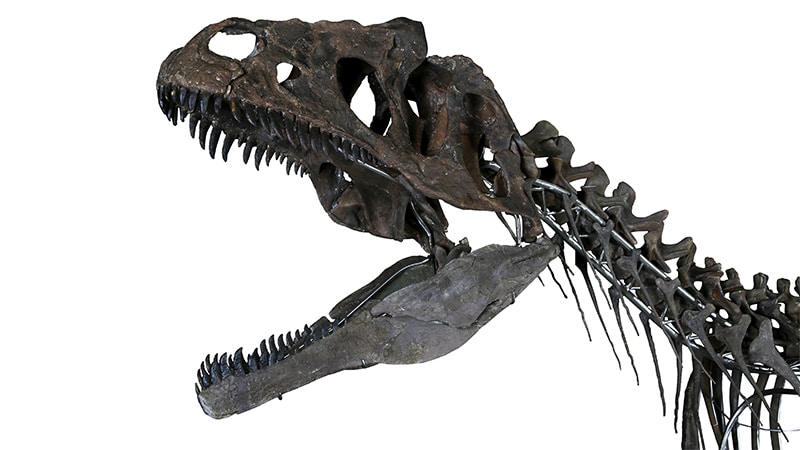
An almost complete dinosaur skeleton, auctioned by Aguttes at the Eiffel Tower in Paris on June 4, is making headlines after it sold for an astounding $2.3 million, much higher than the $1.4 million to $2.1 million estimated by the French auction house. The steep price paid by a French art collector was justified given that the 150-million-year-old fossil, believed to be that of a new dinosaur species, is the only one of its kind discovered to date.
The prehistoric predator’s remains were unearthed over a three-year period from 2013 to 2015 at the Morrison Formation in the western United States. Centered in Wyoming and Colorado, the area is the most fertile single source of dinosaur fossils in North America. Measuring 2.6 meters tall and 8.7 meters from its head to the tip of its tail, the almost intact skeleton was initially believed to be an Allosaurus. The genus of large theropod dinosaurs, which lived during the late Jurassic (145 to 163 million years ago), were characterized by their short three-fingered forelimbs, large heads, short necks, and long, massive tails to balance their bodies.

However, in 2017, while preparing the skeleton for display, Belgian dinosaur expert Pascal Godefroit and Simone Maganuco of the Museum of Natural History, Milan, found some significant anatomical differences from known Allosaurus, This specimen had more teeth, a more prominent pelvis, and longer shoulder blades. The scientists also found that the skull bones were very different from other theropods, leading them to believe it was a new species. Godefroit wrote in the auction catalog, “The specimen displays a series of characters that are unusual in Allosaurus, suggesting that it might belong to a new, still unnamed, taxon [group] of allosaurid theropod.”
However, Thomas Carr, a vertebrate paleontologist and an associate professor of biology at Carthage College in Wisconsin, who wasn't involved in the auction, is not convinced. Prior to the June 4 auction, the expert told Live Science, "It's just hype — they're just trying to get a higher price for it. It looks no different from any Allosaurus that I've ever seen."
While the dinosaur will have to be examined to determine who is right, one thing nobody seems to be disputing is that the magnificent creature lived a long life. Eric Mickeler, a paleontologist, and advisor to the Paris auction house, says, "It had accidents along the way, it had fractures that healed... but it didn't die from them.”

Given that the fossil was found on private land, the sale was perfectly legal under US laws. However, the auction did cause some controversy because many experts believed the skeleton belonged to a museum and should not have been sold to a private collector. Their bigger concern is that if dinosaur fossils found on US private land continue to fetch high prices, more people will be tempted to view it as a business venture, robbing scientists, and museums, who are unable to afford them, of scientifically significant specimens. P. David Polly, the president of the Society of Vertebrate Paleontology and a professor of sedimentary geology at Indiana University, told Live Science that the landowners might "not want to work cooperatively with scientists, but rather work with whoever will pay them to work on the land who will give them a cut [of the profit]."
While that may very well become the case in the future, the owner of this magnificent, mysterious dinosaur has assured the auctioneer that it will be housed in a museum and available to scientists for further research.
Resources: agencepressfrance,phys.org, artdailly.com,amp.livescience.com
